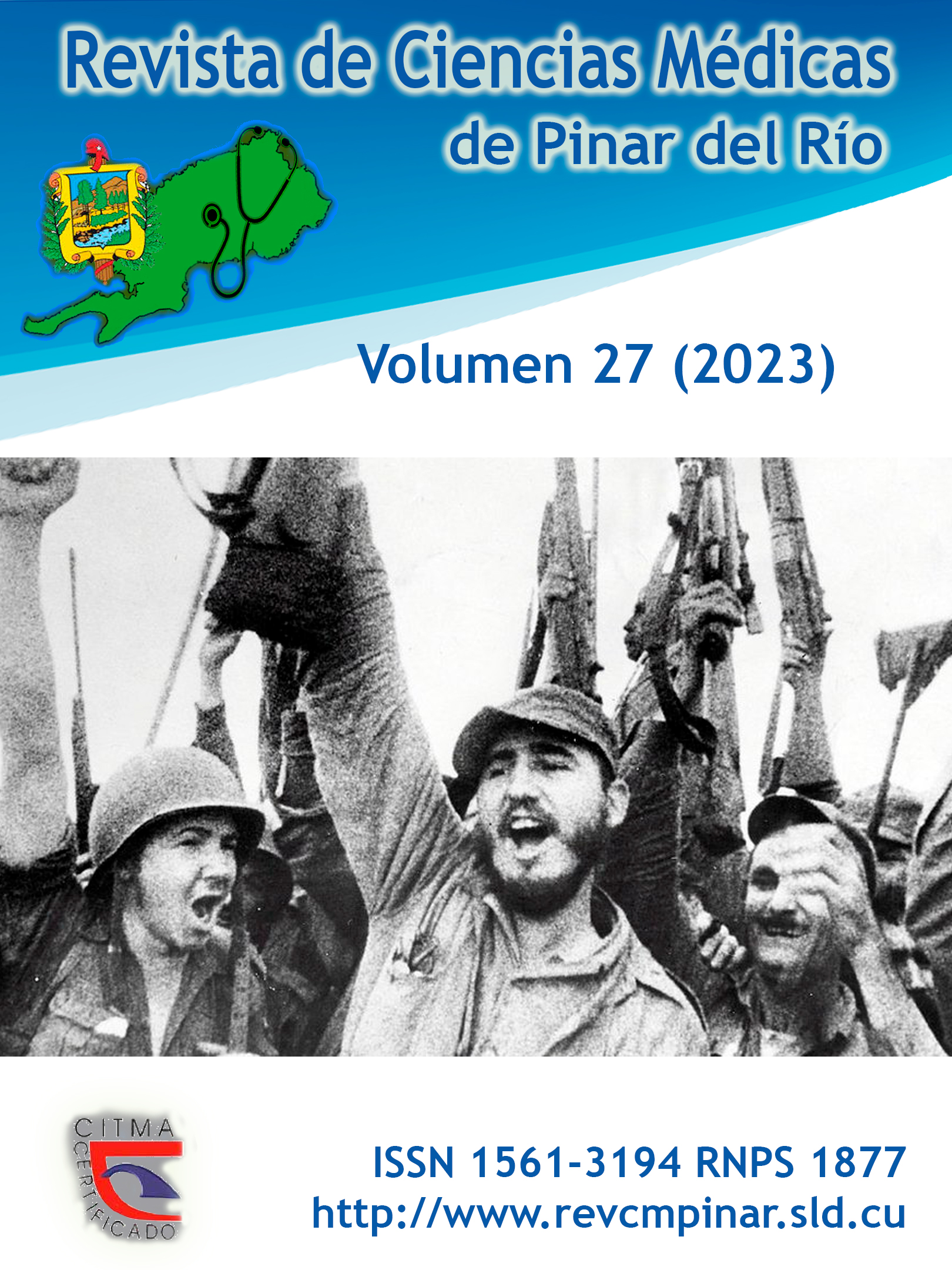Factores asociados al desarrollo de la gastritis en estudiantes universitarios
Palabras clave:
GASTRITIS, ESTUDIANTES, ESTRÉS, ESTILO DE VIDA.Resumen
Introducción: la gastritis constituye una entidad común en la población de forma general. En los universitarios se asocia a disminución del rendimiento académico.
Objetivo: describir las causas más comunes en el desarrollo de la gastritis en estudiantes universitarios
Métodos: se realizó una búsqueda de información con el empleo de la base de datos SciELO y Google Académico. Para la recopilación de la información se emplearon fórmulas específicas para cada base de datos, mediante la combinación de términos con operadores booleanos. Para la selección de la información se procedió a determinar entre los artículos recuperados, las monografías, tesis, artículos y demás información arbitrada que se publicaron entre 2020 y 2022.
Desarrollo: en el contexto latinoamericano y ecuatoriano, la bibliografía disponible sobre gastritis en universitarios es escaza. En el desarrollo de la gastritis convergen factores higiénicos tanto personales como de los alimentos y el agua, lo cual favorece la infección por Helicobacter Pylori, principal agente causal. Factores como el tabaquismo y el consumo de alcohol afectan la mucosa gástrica y predisponen al desarrollo de gastritis. El estrés constituye un agente de importancia en los universitarios para el desarrollo de esta enfermedad. Se deben trazar campañas educativas dirigidas a los estudiantes, así como medidas para el tratamiento de la misma.
Conclusiones: se identifican como principales factores causales de la gastritis al Helicobacter Pylori, las condiciones higiénico-sanitarias, la alimentación deficiente y poco nutritiva así como el estrés.
Descargas
Citas
1. Gaspar Paucar ME, Jacobe Medrano VM. Prevalencia de Factores de Riesgo Tradicional de la Gastritis en Universitarios de Huancayo 2016. [Tesis de titulación]. Perú: Universidad Peruana Los Andes; 2017 [citado 27/09/2022]. Disponible en: https://hdl.handle.net/20.500.12848/155
2. Arroyo Espinoza YL, Pacheco Bautista BE. Evaluación de los hábitos alimentarios y parámetros antropométricos en pacientes con gastritis de 20 a 60 años que acuden al centro de especialidades médicas y salud familiar CEMESFA en la ciudad de Babahoyo Año 2021. 2021 [citado 27/09/2022]; Disponible en: http://repositorio.ucsg.edu.ec/handle/3317/16942
3. Murillo-Zavala AM, Moreira-Rivadeneira KM, Campos-Pachito MJ, Lucas-Parrales EN. Helicobacter pylori y su asociación con hábitos alimenticios en adolescentes de la parroquia San Mateo ciudad Esmeraldas. Polo del Conocimiento [Internet]. 2021 [citado 27/09/2022]; 6(5):150. Disponible en: https://polodelconocimiento.com/ojs/index.php/es/article/view/2642
4. Cuases MGP. Estrés factor predisponente para gastritis nerviosa. Boletí¬n Informativo CEI [Internet]. 2021 [citado 27/09/2022]; 8(2):60-4. Disponible en: https://revistas.umariana.edu.co/index.php/BoletinInformativoCEI/article/view/2677
5. Collantes Delgado JA, Ojeda García LM. Prevalencia de Helicobacter Pylori en Pacientes Adultos con Gastritis que se Atienden en el Laboratorio “La Luz” en el Año 2019 en Jaén. Universidad Nacional de Jaén [Internet]. 2021 [citado 27/09/2022]. Disponible en: http://localhost/jspui/handle/UNJ/196
6. Gisbert JP, Alcedo J, Amador J, Bujanda L, Calvet X, Castro-Fernández M, et al. V Spanish Consensus Conference on Helicobacter pylori infection treatment. Gastroenterol Hepatol [Internet]. 2022 [citado 27/09/2022]; 45(5):392-417. Disponible en: https://pubmed.ncbi.nlm.nih.gov/34629204/
7. Öztekin M, Yılmaz B, Ağagündüz D, Capasso R. Overview of Helicobacter pylori Infection: Clinical Features, Treatment, and Nutritional Aspects. Diseases [Internet]. 2021 [citado 27/09/2022]; 9(4):66. Disponible en: https://pubmed.ncbi.nlm.nih.gov/34698140/
8. Suzuki H, Nishizawa T, Hibi T. Helicobacter pylori eradication therapy. Future Microbiol [Internet]. 2010 [citado 27/09/2022]; 5(4):639-48. Disponible en: https://pubmed.ncbi.nlm.nih.gov/20353303/
9. Sharif Z, Mubashir M, Naqvi M, Atique H, Mahmood S, Ullah M. Randomized Clinical Trial on the Efficacy of Triple Therapy Versus Sequential Therapy in Helicobacter pylori Eradication. Cureus [Internet]. 2022 [citado 27/09/2022]; 14(5):e24897. Disponible en: https://pubmed.ncbi.nlm.nih.gov/35706754/
10. Chimborazo Hidalgo EE. Determinar la eficacia de los métodos, Elisa en suero sanguíneo y la detección cualitativa del antígeno de Helicobacter pylori en heces fecales en los estudiantes de bioquímica y farmacia – ESPOCH. 2021 [citado 27/09/2022]; Disponible en: http://dspace.espoch.edu.ec/handle/123456789/14760
11. Colala Sánchez A de los Á, Flores Moreira HA. Caracterización clínica de la gastritis crónica por Helicobacter pylori en pacientes de 20 a 50 años que asisten al área de gastroenterología del Hospital Básico IESS de Durán. 2020 [citado 27/09/2022]; Disponible en: http://repositorio.ucsg.edu.ec/handle/3317/14950
Descargas
Publicado
Cómo citar
Número
Sección
Licencia
Aquellos autores/as que tengan publicaciones con esta revista, aceptan los términos siguientes:- Los autores/as conservarán sus derechos de autor y garantizarán a la revista el derecho de primera publicación de su obra, el cuál estará simultáneamente sujeto a la Licencia de reconocimiento de Creative Commons que permite a terceros compartir la obra siempre que se indique su autor y su primera publicación esta revista.
- Los autores/as podrán adoptar otros acuerdos de licencia no exclusiva de distribución de la versión de la obra publicada (p. ej.: depositarla en un archivo telemático institucional o publicarla en un volumen monográfico) siempre que se indique la publicación inicial en esta revista.
- Se permite y recomienda a los autores/as difundir su obra a través de Internet (p. ej.: en archivos telemáticos institucionales o en su página web) antes y durante el proceso de envío, lo cual puede producir intercambios interesantes y aumentar las citas de la obra publicada. (Véase El efecto del acceso abierto).



